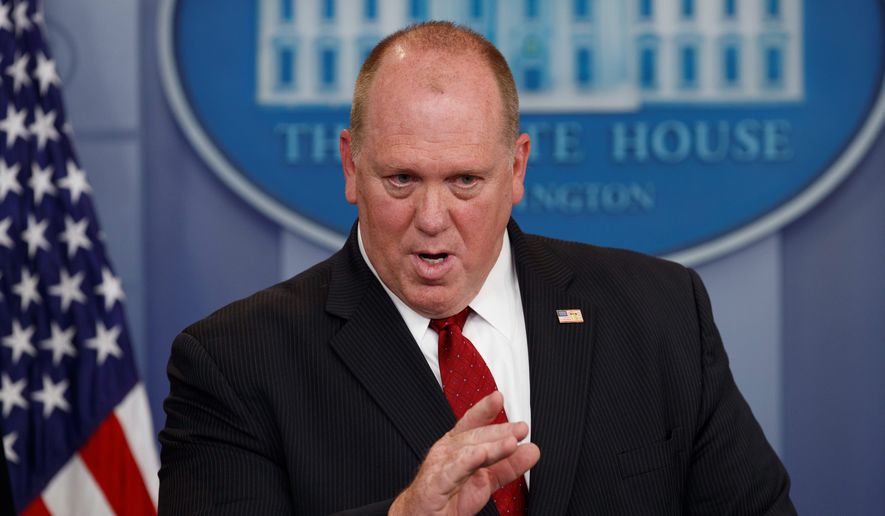President Trump on Tuesday nominated Thomas D. Homan to become the permanent head of U.S. Immigration and Customs Enforcement, in a move that heads off what could have been a crisis of leadership at the critical agency.
Mr. Trump acted with just two days left before the Vacancies Act would have kicked in, and forced Mr. Homan to give up authority to make decisions as acting director — where he’s been since the first days of the new administration.
Now that he’s been nominated, the position can continue to hold authority. Mr. Homan is deputy director and will remain the senior official performing the duties of the director, meaning he’ll function as the agency chief while the nomination is pending — meaning he’ll continue to be the driver behind the president’s immigration crackdown.
Mr. Trump also nominated Jason Klitenic on Tuesday to be the new general counsel at the Office of the Director of National Intelligence, again moving to head off an impending clash with the federal Vacancies Act.
Under the 1998 law, an administration can leave acting official in place for up to 300 days, but beyond that the acting official must be ousted or the position loses power. The only exception is if a permanent nominee has been submitted to the Senate, which resets the clock.
Mr. Trump has lagged far behind his predecessors in making those nominations, and the Vacancies Act deadline for positions vacant as of his Jan. 20 inauguration kicks in this week, which could perhaps sap dozens of positions of their power.
SEE ALSO: ICE agents rebel, say Trump ‘betrayed’ them by leaving Obama’s people in place
According to nomination trackers, more than 200 key positions remain unfilled — though some of those do have picks pending, meaning the acting officers can still make decisions.
The Government Accountability Office, which is charged by law with policing the vacancies, has a clunky web page that lists dozens of jobs that would appear to be in danger of losing authority this week.
Among those are a series of division chiefs at the State Department and U.S. Agency for International Development; the chief counsel at the IRS; several posts at the Environmental Protection Agency; and the head of the Justice Department’s Office on Violence Against Women.
Mr. Trump’s Office of Management and Budget, which oversees the federal bureaucracy, did not respond to requests for comment this week.
The State Department didn’t have a response in time for this article on the multiple vacancies it’s dealing with.
The Washington Times began asking the Homeland Security Department about Mr. Homan and the Vacancies Act deadline earlier this month.
Both of the top immigration enforcement agencies at the department have been operating with acting chiefs since the beginning of the administration.
Kevin McAleenan, who’s been serving as the commissioner of U.S. Customs and Border Protection, was already nominated to be the permanent commissioner. His nomination has been pending in the Senate for months, so his position was secure.
But Mr. Homan has been twisting for months as a debate went on behind the scenes about whether he, or someone else, should be chief at ICE.
Without a new nomination, the post would have been stripped of authority and decisions would most likely have devolved to Mr. Homan’s boss, the Homeland Security secretary. At this point, that person is Elaine Duke, who is also acting as secretary in lieu of John F. Kelly, who gave up the job over the summer to become chief of staff at the White House.
The Vacancies Act was intended to make sure a president doesn’t duck his duty to gain advice and consent from the Senate for top Executive Branch officials. Congress feared a president could just leave an acting official in place for years, never having to win confirmation.
Under the law, jobs can only be vacant for 210 days — or for 300 days at the beginning of an administration.
For jobs that came open on Jan. 20, that means they are only effective through Wednesday.
Under the law, any action taken by someone in violation of the Vacancies Act is invalid, and becomes subject to legal challenge. That could have been a severe blow to Mr. Trump’s immigration policy had Mr. Homan’s powers lapsed this week, just as he’s overseeing the agency’s restructuring of deportation priorities and its fight against so-called sanctuary cities.
“On Day 301, whenever that day might occur for a particular office, the office would be designated vacant, for purposes of the Vacancies Act, and only the head of the agency would be able to perform the functions and duties of that vacant office,” the Congressional Research Service said in a legal memo earlier this month, anticipating the looming deadline.
Agencies are supposed to self-report their vacancies to the comptroller general, but that process appears to be honored as much in the breach as in the observance.
The GAO said it periodically sends periodic reminders to agencies to prod them to report, and also accept tips from Congress and the public. The GAO flagged two violations earlier this year in March for openings dating back to the Obama administration, but all told has noted just nine violations over the last decade.
• Stephen Dinan can be reached at sdinan@washingtontimes.com.




Please read our comment policy before commenting.